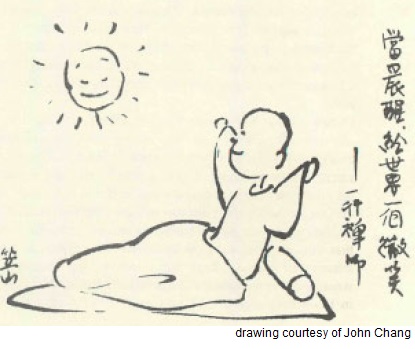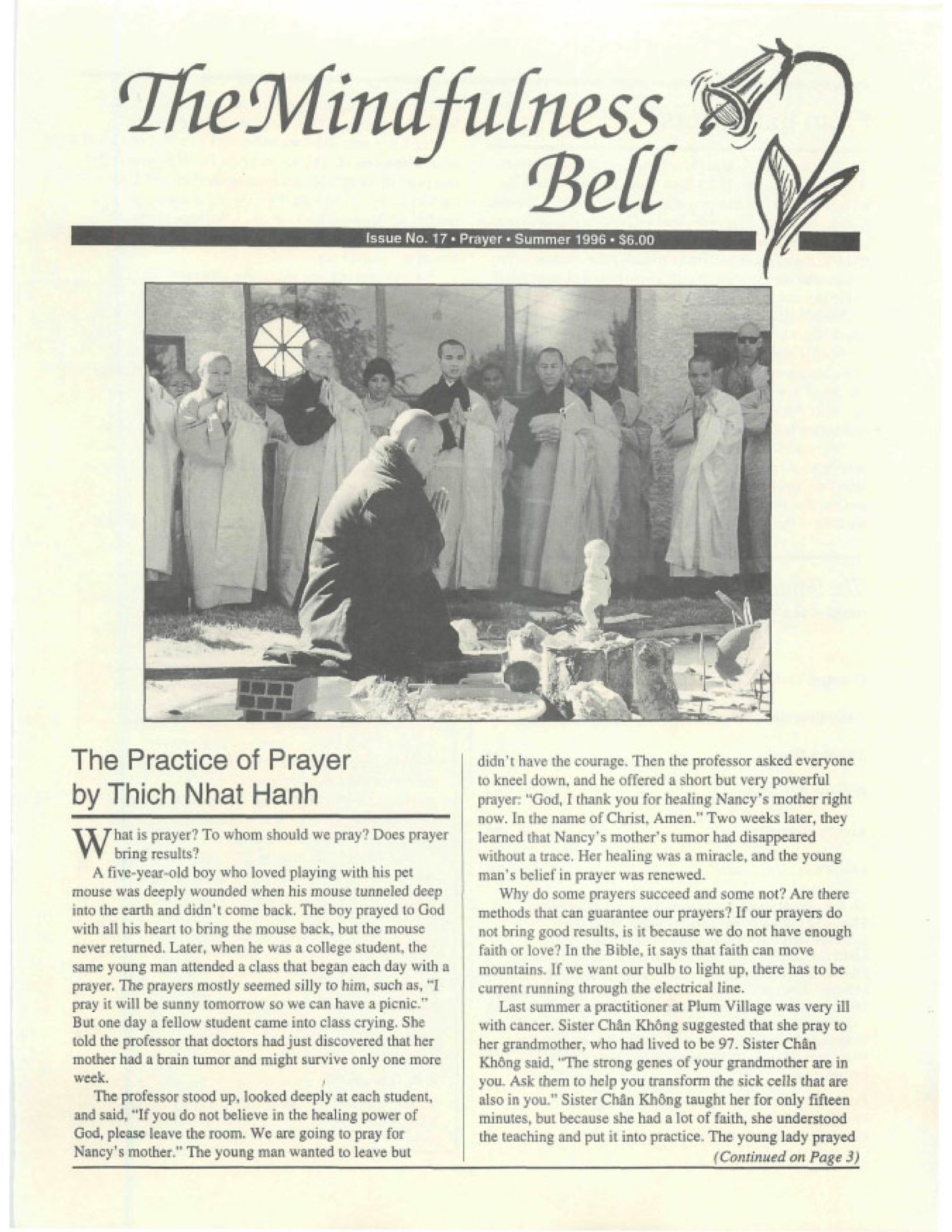By Marcel Geisser
The second meeting of the German-speaking members of the Order of Interbeing was held on June 10, 1996. Present were Thay Nhat Hanh, Sr. Chan Khong, Sr. Jina, Marcel Geisser, Karl Schmied, Karl and Helga Riedl, Manfred Folkers, Gabriela Flagge, Annette and Reiner Landgraf, Steffi Hoeltje, and Margret de Backere.
Thay’s visit in June was a big event and successful on all levels. His public lectures at Oldenburg, Cologne, and Mainz were sold out,
By Marcel Geisser
The second meeting of the German-speaking members of the Order of Interbeing was held on June 10, 1996. Present were Thay Nhat Hanh, Sr. Chan Khong, Sr. Jina, Marcel Geisser, Karl Schmied, Karl and Helga Riedl, Manfred Folkers, Gabriela Flagge, Annette and Reiner Landgraf, Steffi Hoeltje, and Margret de Backere.
Thay's visit in June was a big event and successful on all levels. His public lectures at Oldenburg, Cologne, and Mainz were sold out, and each of them drew an audience of around 1,200 people. It was also a big test on how well the Order of Interbeing would work as a Sangha on such a large five-day retreat of 370 people. It was inspiring for all of us, and we happily realized, even though we are a group of many different personalities, we were really able to work together as a Sangha in harmony.
After the retreat at Oldenburg and the two Days of Mindfulness on the Museum-Island Hombroich, we experienced an extremely informative morning with Thay, discussing questions concerning the Order. On our part the following crucial questions arose:
- How can the Order help and support in view of the expanding and in many places newly arising communities and thereby assure a durable quality of the practice?
- What can we do about the furtherance of our spiritual achievements?
- In the long run, do we need a more distinct organizational structure, e.g. in the form of an incorporated society?
- How much liberty do we have concerning organization and rituals?
- How do we deal with the fact that some people are also rooted in different traditions or in the future even could wish to work together with a different teacher or become his (or her) disciple?
- What does the financial situation of the Order look like, and may members in future attend retreats at cost price?
Here are some summarized answers given by Thay: Thay is inclined to return with increased force to traditions that have stood in test during a history of 2,600 years as far as subjects of the Dharma are concerned. He sees some of the work we do as part of a transition period. It is Thay's wish that Dharma teachers and members of the Order make an effort to attend longer retreats, such as the three-month winter retreat at Plum Village, this being at present the best opportunity for future training.
The Beginning Anew and the Commitment to Harmony practices are valid as models for solving conflicts, and the latter needs to be revised.
The admission of new Order members requires the consent of the regional Sangha. The exact procedure has to be worked out. The main reason to apply for admission to the Order can be found in the wish to found a community or to support one already existing or to pass on the practice of training.
Regional leaders of a Sangha should be offered advanced training. Dharma teachers will have to elaborate a workable draft by the beginning of the retreat in September. At present, all Sangha leaders are requested to make use of this type of further training.
In principle we are desired to audit seminars of teachers of different traditions and learn from them. The condition for this is a well-founded practice in one's own tradition. Work with a different teacher should deepen one's own tradition and the relation to one's root teacher.

A Sangha should not split up before it has four Order members. It is not necessary for each member to found a separate Sangha, but he/she should practice together with other members. This point is not obligatory, but rather a guiding recommendation.
The German Order of Interbeing should in future encompass all German-speaking countries as one unit. Certain organizational and legal domains should only be dealt with at a national level (e.g. founding of an incorporated society).
Particular emphasis was put on a question of advanced training. Concerning this subject, Dharma teachers will consult the model of RIGPA and Jack Lawlor's manual. General remark: Cooperation, Dharmic education, and the problem of finding consent are in the focus of interest.
These notes were submitted by Dharma teacher Marcel Geisser, True Realisation, the cofounder of Haus Tao in Switzerland.

